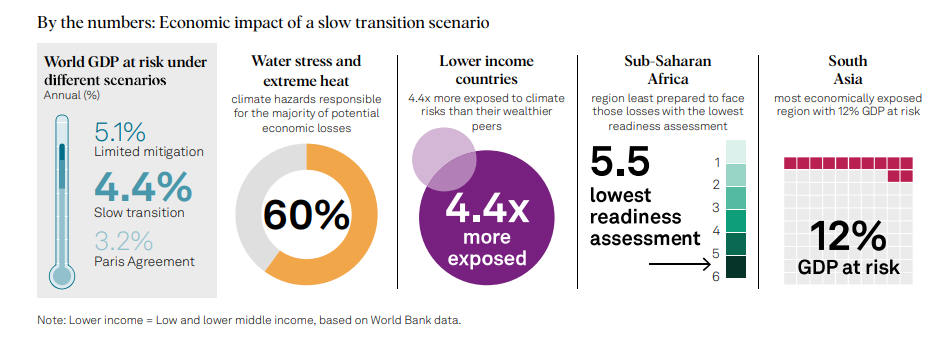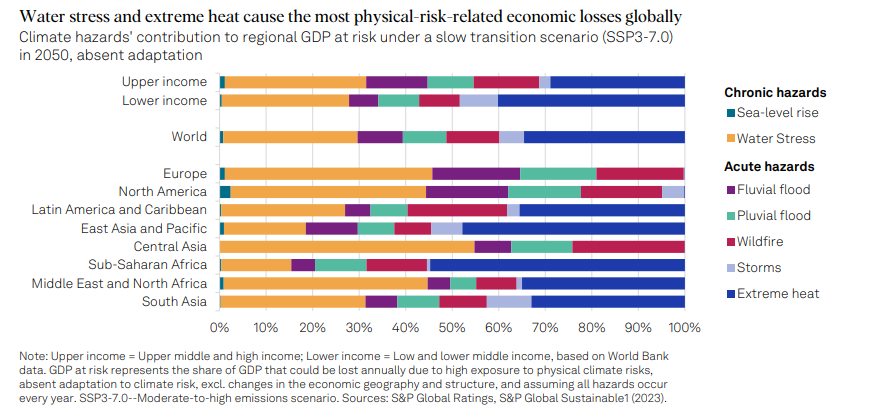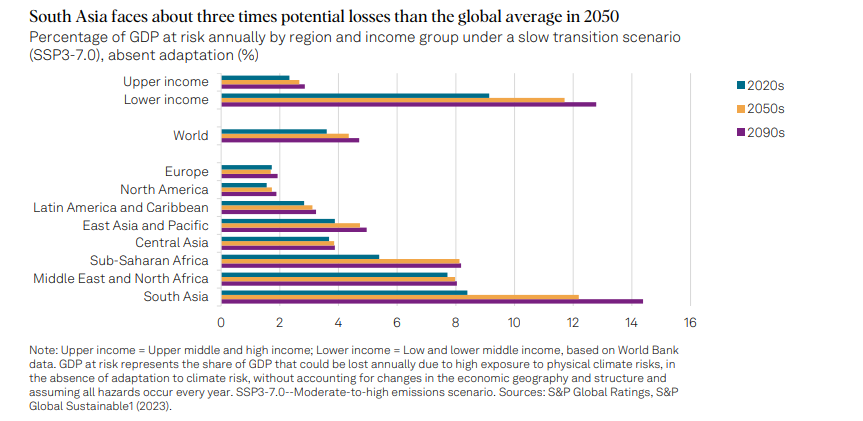A new study by S&P Global Ratings, “Lost GDP: Potential Impacts Of Physical Climate Risks,” warns that if global temperatures rise beyond 2°C, up to 4.4% of the world’s GDP could be lost annually due to the physical impacts of climate change in the absence of adaptation measures.
Developing nations, in particular, are at a higher risk and are less prepared to handle the economic fallout, according to the report.
The research, which as S&P explains aims to “provide insights into the potential exposure and readiness of rated countries to different types of climate hazards,” tested four climate scenarios to assess the potential economic damage of seven climate hazards, including wildfires, floods, storms and extreme heat, in 137 countries.
The report starts off by highlighting the increasing economic impact of natural disasters, citing Swiss Re statistics of a 5-7% annual growth in insured losses from 1992 to 2022 — “with more severe climatic events accounting for the majority of insured losses.”
The authors of the report also cite a UN Office for Disaster Risk Reduction 2022 report estimating that the number of disasters by 2030 could be 40% higher than in 2015 if mitigation is not stepped up.
The key finding, under a “slow transition” scenario (see infographic below), where a temperature increase of 2.1°C is expected by 2050, is that up to 4.4% of the global GDP could be lost annually in the absence of adaptation measures.

In this (slow transition) scenario, water stress and extreme heat, contributing to about 60% of this impact, are identified as the climate hazards responsible for the majority of potential economic losses.
Other hazards like pluvial flooding, fluvial flooding, and wildfire contribute between 10% and 15% to losses each.

According to the report, developing regions are predicted to bear the brunt of these climate hazards, with lower-income countries being 4.4 times more exposed to risks than their wealthier counterparts. Developing regions are also found to be “less able to prevent permanent losses.”
Related Articles: Almost a Third of America’s GDP Growth Connected to Climate Change | New Report Reveals True Financial Cost of Climate Change | The Impact of Climate Change on the Economy
Among regions, South Asia is identified as the most vulnerable to climate change; with about 12% of its GDP at risk annually by 2050 in the slow transition scenario, it “faces three times more potential economic losses than the world average.”
Sub-Saharan Africa and the Middle East and North Africa (MENA) follow closely behind, each facing an 8% risk to GDP. North America and Europe are projected to experience less than a 2% GDP risk.

The report also introduces a readiness assessment metric, evaluating countries’ abilities to avoid, respond to, and recover from physical climate risks: North America and Europe, despite being less exposed to physical climate risk, are the most prepared regions while Sub-Saharan Africa is identified as the least prepared region to face losses from climate hazards, with lower-income areas consistently scoring lower than their higher-income counterparts.
While emphasizing the need to invest in climate adaptation to mitigate these risks, the report highlights significant barriers to funding adaptation measures. Most adaptation finance is provided in the form of debt instruments, and as financial conditions tighten, the situation may worsen, especially in an environment of higher interest rates.
The findings underscore the urgency for global cooperation in addressing climate change, with a focus on supporting vulnerable nations and promoting sustainable adaptation measures.
Editor’s Note: The opinions expressed here by the authors are their own, not those of Impakter.com — Featured Photo Credit: Rawpixel.









